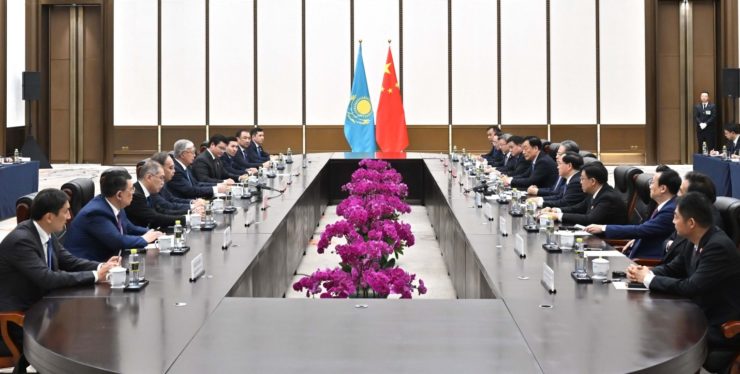
Last year saw a number of significant developments in China-Kazakhstan relations, including two official visits to China by Kassym-Jomart Tokayev, multi-billion dollar contracts, the promotion of transport and infrastructure initiatives, and an unprecedented 30 per cent growth in bilateral trade. Kazakhstan accounts for half of China’s trade and investment in the region, with trade turnover between Kazakhstan and China reaching an impressive $31 billion. By 2023, the volume of cargo between the two countries will have increased by 22 per cent to nearly 30 million tonnes, and the share of cargo passing through Kazakhstan as part of the China-Europe route will have reached 80 per cent. China is implementing projects in Kazakhstan with a total value of $14 billion.
The trend towards the development of bilateral relations continued in 2004, as the events of the first three months of the year clearly show.
At the beginning of the year, a Kazakh transport terminal was opened in Xi’an to sort cargo and form railway trains for bilateral transport and transit along the China-Europe route through Kazakhstan. A joint industrial park was launched in the border city of Khorgos, and the two sides agreed to open a Kazakh trade mission in Urumqi, the capital of the Xinjiang Uygur Autonomous Region.
On 26th March the President of Kazakhstan met with Erkin Tuniyaz, Chairman of the Xinjiang People’s Government. This region, which shares a long border with Kazakhstan, where the main transit border crossings along the China-Europe route (Khorgos and Dostyk) are located, and which accounts for up to 50 per cent of China-Kazakhstan trade, is keen to develop cooperation with Kazakhstan. The two sides discussed the prospects of linking the “One Belt, One Road” initiative and Kazakhstan’s “Nurly Zhol” economic development strategy.
At the end of March, Mr Tokayev took an active part in the Boao International Forum in China. The Forum was held under the theme “Asia and the World: Shared Challenges, Shared Responsibilities” and brought together representatives from more than 60 countries united in their desire to promote international trade, economic, transport and infrastructure integration in Asia.
Speaking at the Forum, Mr Tokayev noted Kazakhstan’s status as a key partner of China in Central Asia. In Boao, the President of Kazakhstan also expressed his support for the Eurasian Development Bank (EDB) and hailed its contribution to the development of equitable trade in Asia. At the end of his speech, the head of state called on forum participants to work together to implement transport and infrastructure projects such as the Trans-Caspian International Route and the North-South Corridor.
The signing of a Memorandum of Cooperation between the Astana International Forum and the Boao Forum on Asia was an important outcome of the event for relations between the two countries, demonstrating the convergence of visions on the continental trade and economic agenda in the People’s Republic of China and Kazakhstan.
Following his participation in the international forum, the President of Kazakhstan held a meeting with Zhao Leji, Chairman of the Standing Committee of the National People’s Congress (NPC), during which there was a substantive discussion of promising projects and areas of bilateral cooperation. Particular attention was paid to plans to increase oil pipeline capacity and develop gas processing facilities for export to China.
“Tokayev also used the March visit to maintain a dialogue with representatives of major Chinese state-owned enterprises. On 29 March he met Mingsheng Liu, Chairman of the Board of Directors of the State Power Investment Corporation, with which several major energy projects are already underway.
On 30 March, Kazakh Foreign Minister M. Nurtleu visited China and took part in the first meeting of the strategic dialogue at the level of foreign ministers of the two countries. He also held talks with Ding Xuexiang, Vice-Premier of the Chinese State Council, the outcome of which was a statement on “expanding Kazakhstan’s non-resource exports to China”, one of the Republic’s key foreign trade priorities.
Dialogue between the two countries is also developing dynamically through the Shanghai Cooperation Organisation (SCO). During the meeting of Kassym-Jomart Tokayev with the Secretary General of the SCO, Zhang Ming, at the end of March 2024, as well as after the meeting of the Secretaries of the Security Councils of the SCO countries at the beginning of April, the Chinese side positively assessed the initiatives of Kazakhstan as the current chair of the organisation and discussed the agenda of the forthcoming SCO Summit to be held in Astana in the summer of 2024.
In 2024, cooperation between Kazakhstan and the People’s Republic of China in the field of tourism will be developed separately – this year has been declared the Year of Kazakh Tourism in China. Progress is also planned in promoting multilateral dialogue between China and Central Asian states, in which Kazakhstan is an active participant: the Central Asia-China Secretariat was opened in Xi’an on 1 April 2024.
High-level political contacts between the two countries will continue in 2024 – for example, the visit of President Xi Jinping to Astana, who received an invitation to visit Kazakhstan during Tokayev’s last visit to Beijing in October 2023, is scheduled for June.
Undoubtedly, developing a partnership with China is in Kazakhstan’s best interests. The Republic sees it as a way to diversify its exports, secure its status as the largest transport hub in Eurasia, a major investor in a wide range of projects, and an important partner in ensuring stability and security in the region.
Bair Danzanov, independent expert on Mongolia and Central Asia, especially for the online magazine “New Eastern Outlook“